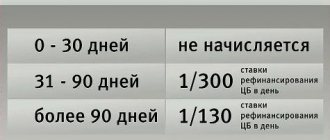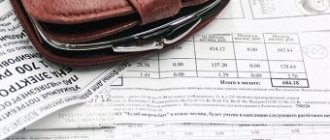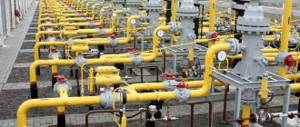In what cases are subsidies for housing and communal services canceled and why are they not paid?
The main reasons for refusal or suspension of payment of benefits are:
- Debt in payment of housing and communal services for a period of more than 2 months. The basis for this is Article 160 of the RF Housing Code.
- Changing your place of registration without notifying the government service that provides you with benefits.
- Loss of disability status.
- Suppliers of housing and communal services did not submit information to the relevant authorities in a timely manner.
Failure to comply with the payment schedule for utility bills will result in cancellation of payment. Every month, resource supply companies compile lists of debtors and send them to the Department of Labor and Social Development of the Locality Administration. Employees of the Labor Department analyze the data and identify beneficiaries-debtors.
The procedure for suspending and resuming compensation payments is regulated by regional authorities . Typically, the accrual of benefits is suspended when the debt exceeds 2 months. The decision is sent to the beneficiary in the form of a letter.
Payment is suspended from the first day of the month following the month in which information about the debt was received. Compensation for utility bills is suspended in full, regardless of what type of service there is arrears for.
Attention! If there is a debt on utility bills, then compensation may be provided if an agreement is concluded to repay the debt.
It is important to understand that this agreement must be completely voluntary for both the consumer and the utility. You cannot arrange it unilaterally.
If you find out why benefits for housing and communal services were removed, you will also receive information when they can be returned. After the debt is closed or an agreement on its repayment is drawn up, payments are resumed, and the beneficiary is accrued an additional payment from the month of suspension of compensation. Specialists from the Department of Labor and Social Development argue that there is no need for citizens to be notified additionally about debt repayment.
Payment for housing and communal services: new in 2021
In connection with the coronavirus pandemic, from April 2021, a number of concessions have been introduced for citizens when paying for housing and communal services. In particular, a ban has been established on charging penalties for utility debts and a moratorium on checking meters. From January 2021, these benefits are canceled, and the rules for issuing rent subsidies and the procedure for collecting debts by management companies are also changing. In addition, in 2021 there will be a planned indexation of utility tariffs within the inflation rate.
Debtors will be charged penalties and fines
According to the Government decree of April 2, 2021, from April 6 to December 31, a ban was introduced on the accrual of penalties and fines on housing and communal services debts. From 2021, penalties for debts will be charged again. However, penalties cannot be charged retroactively, for the period from April to December 2021. From January 1, a penalty may be demanded for debts incurred before April 6 of the outgoing year. And if the debt arose during the moratorium period, citizens will be given a chance to repay the debt, and penalties will be charged only from the 31st day of delay.
How to apply for a subsidy to pay for housing and communal services
According to the Ministry of Construction, during the crisis the number of defaulters in housing and communal services has increased. “In Russia, 30 percent of citizens have utility debts, head of the State Duma Committee on Housing Policy and Housing and Public Utilities Galina Khovanskaya
. She believes that the moratorium needs to be extended, otherwise there will be even more debtors.
When will utility prices go up?
Every year in Russia, fees for housing and communal services are indexed, but the increase cannot be higher than the level of annual inflation. Next year, utility tariffs will increase from July 1. According to Government Order No. 2827-r dated October 30, 2020, maximum tariff increase indices have been established by region. For example, in St. Petersburg they can grow by a maximum of 3.5%, in the Leningrad region - by 3.4%, in the Moscow region - by 3.6%, in Moscow - by 4.6%.
At the same time, in Moscow, starting January 1, 2021, fees for the maintenance, repair and rental of housing will be increased, according to the official website of the mayor of the capital. The rate of payment for the use of residential premises will increase by 3.5%, for maintenance - by 4.6%, and the minimum contribution for major repairs - by 3.5%.
Meters need to be verified
In the near future, Russians should check their meters. From April 6 to December 31 of this year, a moratorium on verification was established. For the first three months after the lifting of the moratorium - until April 2021 - fees for services will be calculated based on the average meter readings for the last six months. If you have not completed the verification, then from April the fee will be charged according to the standard, taking into account an increasing factor of 1.5.
According to the explanations of the Ministry of Construction, if the period for checking the meter has expired before the introduction of the moratorium, then the temporary measures do not apply and the general rules apply. That is, for the first three months, citizens pay according to the average, and then - according to the standard with a coefficient of one and a half.
Online meetings of homeowners will be held on the government services portal
It will be easier to apply for rent subsidies
From January 1, citizens entitled to benefits or compensation for rent are not required to submit documents to the social security authorities about the absence of debts on utility bills. Social security institutions themselves will check the presence or absence of utility debts through the GIS housing and communal services information system. If there is a debt, the right to a subsidy is canceled.
Large families, disabled people, and veterans receive utility benefits. A subsidy for utility bills is provided to families whose income is spent more than 22% on utility bills. “We insisted on lowering this threshold to at least 15% in Russia,” Galina Khovanskaya told Parlamentskaya Gazeta. “President Vladimir Putin supported this proposal and instructed Prime Minister Mikhail Mishustin to consider the issue before November, but this has not been done yet.”
Khovanskaya noted that in a number of regions this figure has already been reduced. For example, in Moscow, families who spend more than 10% of their income on utilities receive a subsidy.
Who can receive a housing certificate
Payments can be made through the MFC, the social protection department or through the government services portal. To do this, you need to provide certificates from all family members over 16 years old about income or lack thereof, receipts for payment of housing and communal services, and details of the bank account to which financial assistance will be credited.
When collecting debts, you will need to provide personal information
Starting from the new year, the rules for collecting debts for utility services by management companies will change. According to the law, which comes into force on January 1, 2021, the management company, resource supply organization and regional capital repair operator must, when filing a lawsuit against a utility debtor, indicate one of the citizen’s identifiers - passport data, INN, SNILS, driver’s license number. It is assumed that they will be able to request this data from the authorities through the court. This procedure will allow you to obtain the necessary information and protect personal information about citizens.
What to do if a citizen does not agree with the decision?
- You must obtain a certificate stating that you are entitled to benefits from the social security department of the locality at your place of residence.
- In addition, you need to collect all the necessary documents depending on what category of citizens you belong to (retired, disabled, veteran, etc.).
- With the collected set of documentation, contact the local social security department (not the management company).
- If your application is rejected, send a written complaint to the central department of social protection of the city in which you live.
- If this does not help, then you will have to go to court in connection with the violation of your rights. Please consult with a lawyer first. He will help you correctly draw up all the necessary documents and save your nerves.
Moratorium on fines for late payment of housing and communal services may be extended until spring
The government may allow the population and management companies not to pay fines due to late payments for housing and communal services next year. According to Kommersant, the first meetings at which the extension of this moratorium imposed due to the coronavirus will be discussed will be held next week. Energy workers have already asked the government not to extend the preferential regime: the industry fears that the moratorium could be extended until the spring of 2021. Due to the abolition of fines, paying for heat and electricity has become worse; by the end of the year, debts will increase by 50 billion rubles, energy companies warn.
The government is beginning to discuss the possibility of extending the moratorium on the assessment of fines for late payments for utilities and contributions for major repairs, several sources told Kommersant. The preferential regime for the population and management companies was launched in April and is due to end on January 1, 2021. It is not yet clear whether this period will be extended; the first meetings on this issue should be held next week, Kommersant’s sources say.
Kommersant's interlocutors at energy companies fear that the moratorium may last until March.
A special procedure for paying for utility services is established by Government Decree No. 424. Its goal is to support the population during the pandemic (see Kommersant, April 6). The resolution cancels fines for late payments and also prohibits disconnecting consumers for debts until the end of the year.
The hasty adoption of the resolution on universal benefits caused sharp criticism from energy workers. Sales and generation companies suggested that the government instead organize targeted assistance, for example, for people over 65 years of age and for those infected with the virus. The companies managed to bring the issue of canceling the preferential regime from June 1 to a meeting on the development of the fuel and energy sector with Russian President Vladimir Putin, but in the end the presidential administration did not agree on this decision (see Kommersant on May 20).
Now energy workers are asking the government not to at least extend the decree beyond January.
The Association of Guaranteed Suppliers and Energy Sales (SPE, unites the largest generating companies) and the Association of Regional Settlement Centers made such a request to the Ministry of Construction and the Ministry of Energy (Kommersant has a document dated December 8). The associations write that payment discipline has worsened since the introduction of the preferential regime, and predict that payment levels will remain low until the end of the year. This, according to their calculations, will increase the debt for electricity and heat supply by at least 30–50 billion rubles. by the end of the year. The Ministry of Energy told Kommersant that they had not received the letter, and the Ministry of Construction did not respond to the request.
Moratorium on penalties in communal services increased non-payments
The most significant reduction in the level of payment for thermal energy - by 12% - occurred in April. From April to November, the cumulative decline in payments amounted to 1.7% year-on-year, or 12.2 billion rubles, the SPE told Kommersant. Accounts receivable for consumed heat as of October 1 amounted to 176 billion rubles. At the end of the year, the figure may increase by 10%, to 212.5 billion rubles.
Electricity payments also collapsed in April-June (minus 5-6%). Moreover, from January to September the level of population payments was 1.7% worse than last year’s indicators, in October - by 2.7%, in November - already by 6%. Management companies and homeowners' associations reduced payments by 7% in October-November, the associations said in a letter. At the same time, according to data as of September 30, the total debt of the population for electricity is 104.8 billion rubles, housing and communal services organizations - 60.7 billion rubles.
Since the beginning of the year, the increase in debts for these consumer groups amounted to about 29 billion rubles, according to data from the Center for Financial Settlements.
The moratorium initially looked like a controversial mechanism, says Vladimir Sklyar from VTB Capital. Instead of targeted support for consumers who need it, virtually everyone is provided with an interest-free loan from the funds of electricity companies, with the risk of non-payments spreading along the chain, including fuel suppliers. However, according to his assessment, this has not led to acute problems: the population continues to fulfill its obligations, and the growth of debt does not look critical. In these conditions, the extension of the program is unlikely to create any significant financial support for consumers, but will increase the risks of the financial stability of companies, primarily energy sales and heat suppliers during the heating season, Mr. Sklyar believes.
Polina Smertina, Tatyana Dyatel
From the history of the issue
Today you can pay your apartment and utility bills in banks, through payment agents and at Russian Post. In some areas of our country, Sber accepts from 30 to 70% of payments for utilities
. A huge share of the total volume of payments for housing and communal services is served by VTB Bank and Russian Post. And in addition to banks and the Russian Post, in our country there are more than a thousand different organizations that accept utility payments and payments for apartments. It is the provision of a service, and the service has a cost.
FAS revealed that the payer paid a double commission: it was included in the tariff when calculating the payment, first by the provider of housing and communal services, then when paying the bill directly to the bank (or other organization servicing such payments). Depending on where the payer paid the utility bills.
Having identified this feature, the FAS came up with a proposal to the government to prohibit the inclusion of bank commissions in the tariffs of resource supply organizations
. In September 2021, a government decree was issued on this. It came into force in September 2021.
Therefore, when the State Duma announced its intention to abolish commissions for payments by banks, payment operators and Russian Post, a logical question arose - who will compensate for the costs of collecting payments
for housing and communal services, if this is prohibited for both suppliers and organizations accepting payments.









